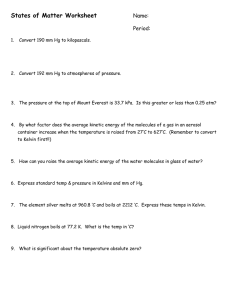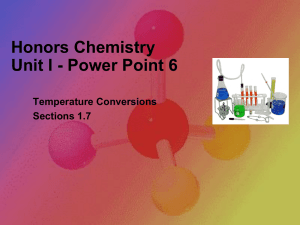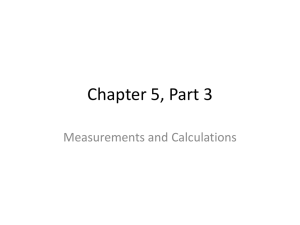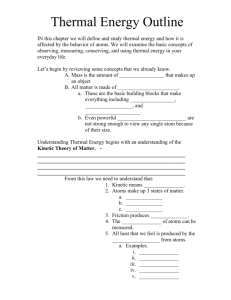Intro to Heat
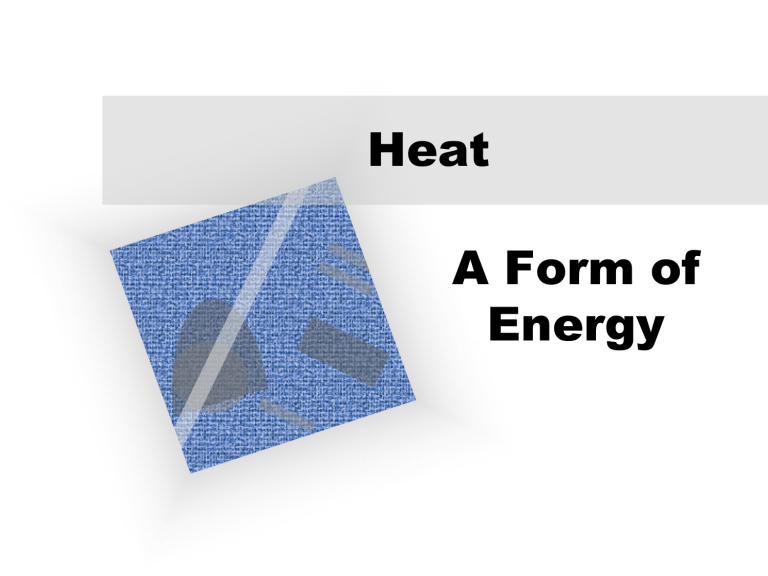
Heat
A Form of
Energy
Molecules and Motion
• The motion of molecules produces heat
• The more motion, the more heat is generated
Heat Transfer
• The movement of heat from a warmer object to a colder one
Forms of heat transfer
• Three forms of heat transfer:
• Conduction
• Convection
• Radiation
Conduction
• Conduction involves the transfer of heat through direct contact
• Heat conductors conduct heat well, insulators do not
Convection
• Takes place in liquids and gases as molecules move in currents
• Heat rises and cold settles to the bottom
Radiation
• Heat is transferred through space
• Energy from the sun being transferred to the
Earth
Questions
•
What are the three types of heat transfer?
• How is conduction different from radiation?
What type of heat transfer is involved?
• Heating a room with a fireplace
• Egg cooking in a frying pan
• Roof of a house becoming hot
What type of heat transfer?
• Warm air mass bringing a change in the weather
• Wire getting hot from an electric appliance
Temperature and Heat
• Kinetic energy is the energy of motion
• Temperature is the measure of the average kinetic energy of an object
Question
• How is kinetic energy related to heat production?
Thermometer
• A instrument used to measure temperature
• Thermometers commonly have alcohol (with dye) or mercury
• Digital thermometers have replaced older ones
Celsius Scale
• Celsius is the metric scale for measuring temperature
• Water freezes at 0 º C and boils at 100ºC
Kelvin scale
• The Kelvin scale is a metric temperature scale measured in Kelvin units
(K)
• Formula (273+ºC)= Kelvin
Questions
• What is the formula for converting a
Celsius temperature to a Kelvin temperature?
• What is the boiling point of water on the Kelvin scale?
• What is the freezing point of water on the Kelvin scale?
Absolute zero
• The temperature in which all molecular motion stops (0 K)
Questions
• Describe absolute zero.
• What is absolute zero on the Celsius scale?
Measuring Heat
• Increase in temperature
• Addition of heat
• A decrease in temperature
• Removal of heat
Temperature
• Joule is another unit for measuring heat
• Mass and type of substance determine the amount of temperature change
Specific Heat
• The ability of a substance to absorb heat energy (specific heat)
• Different substances absorb heat at different rates
• The greater the mass of the object the more heat is absorbed
Heat and Phase
Changes
• A phase change is a physical change that requires a change in heat energy
• Addition or removal of
HEAT
Questions
• What is freezing point, melting point, and boiling point?
Heat expansion
• The expansion of a substance due to heat
• Most solids, liquids, and gases expand as they are heated
Expansion of water
• Between 4ºC and 0ºC, water EXPANDS as it cools and turns into a solid
Internal energy
• The energy within a substance
Questions
• What is internal energy?
• What happens to most substances when heat is added?
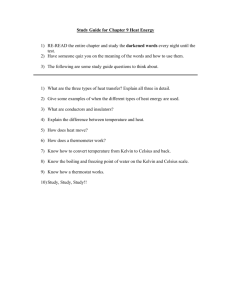
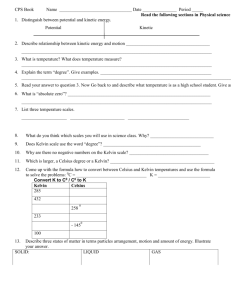
![Temperature Notes [9/22/2015]](http://s3.studylib.net/store/data/006907012_1-3fc2d93efdacd086a05519765259a482-300x300.png)
